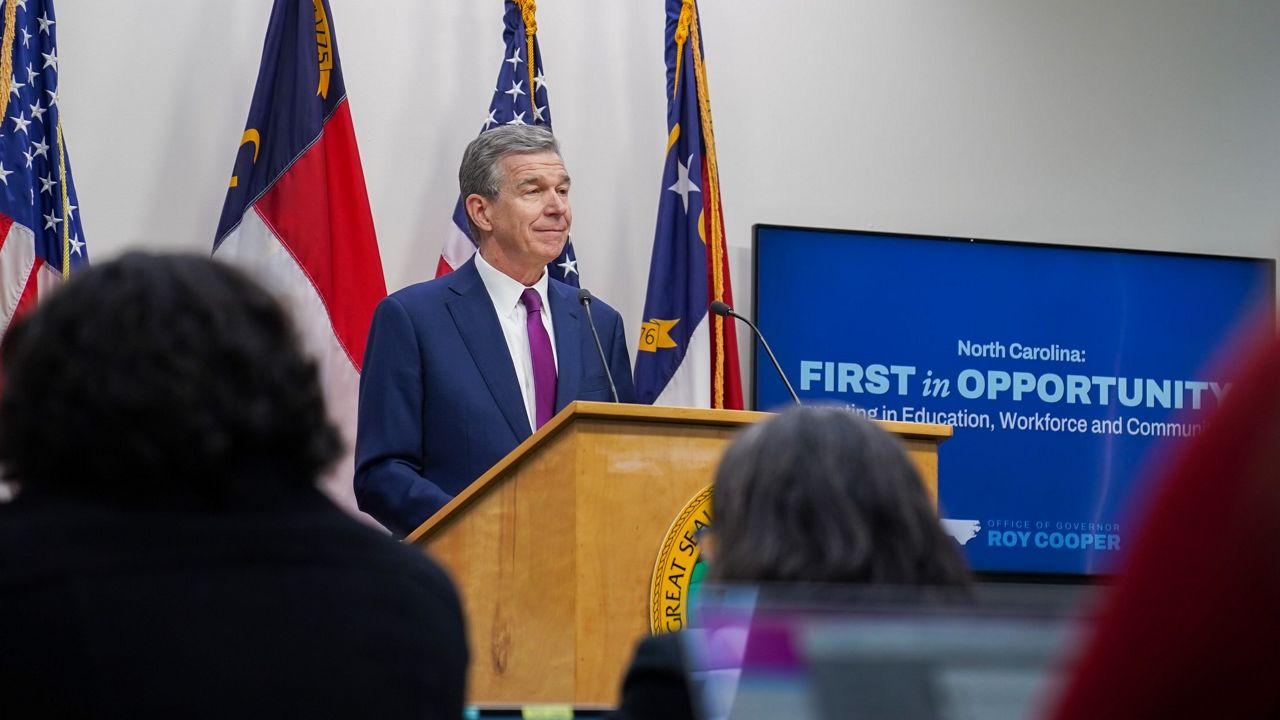RALEIGH, N.C. (AP) — North Carolina's Democratic governor released his state government spending plan on Wednesday that would increase spending by 20% over the next two years, double the increase favored by Republican majorities in the House and Senate.
What You Need To Know
The proposed budget would give public school educators average salary raises of 18% through mid-2025 and 8% raises over two years and added bonuses
Cooper's team says the plan is fiscally sound, as it leaves $6.8 billion earmarked for financial and disaster emergencies
The proposal would increase spending on community-based services for people with disabilities; and sets aside funds for other federal grants and programs
Gov. Roy Cooper says the massive surge in spending is necessary to prepare citizens for future employment to recruit and retain teachers and state employees. The increase would be funded in part by halting already approved income tax decreases for corporations and the highest wage earners for upcoming years. There's also a projected revenue surplus this year of over $3 billion.
“Once-in-a-generation opportunities require once-in-a-generation investments,” Cooper said at a news conference. “This budget we’re presenting today meets the moment.”
The governor's proposed budget would give public school educators average salary raises of 18% through mid-2025 and 8% raises over two years to other school workers employees, along with bonuses of either $1,000 or $1,500 for all of these workers. State employees in hard-to-staff positions also could expect additional pay boosts. The raises are designed to address 5,000 teacher vacancies and those in state government, where vacancy rates are nearly double what they were before the pandemic.
North Carolina average teacher salaries currently rank near the bottom among Southeastern states. Cooper's proposal would raise the base pay for first-year teachers from $37,000 today to $46,000 in fall 2024.
While Cooper’s budget proposal will get a formal review by legislators on Thursday, much of the plan is likely to be set aside by Republicans who control the General Assembly and have embraced across-the-board tax cuts as a major policy achievement.
Senate leader Phil Berger called Cooper's budget “an irresponsible, unserious proposal from a lame-duck governor who wants future North Carolinians to pick up his tab.” Cooper is term-limited from seeking reelection in 2024.
“The General Assembly will continue on the fiscally responsible path that has made our state attractive to so many," House Speaker Tim Moore added in a written statement.
Cooper's office says his plan is fiscally sound, as $6.8 billion will remain earmarked for financial and disaster emergencies.
Cooper also wants to spend $4.5 billion to fund fully a court-mandated plan to address public school inequities stemming from longtime litigation known as Leandro, an early plaintiff. Republican legislators disagree on the size and scope of that education plan.
“The major focus of my budget is strengthening education with historic investments from cradle to career,” Cooper said, also mentioning hundred of millions of dollars budgeted for child care centers and to parents using them. “We can and should make good on the constitutional guarantee of a sound basic education to create opportunity for everybody.”
Since Republicans now hold a veto-proof majority in the Senate and are just one seat shy of a similar margin in the House, they have more leeway to fashion a plan with less spending and potentially more tax cuts, and can worry less about a Cooper veto.
House Republicans are aiming to pass its version of a two-year budget by early next month. The Senate will then approve its own bill, leading to negotiations to get a budget enacted before the new fiscal year begins July 1.
The bottom line numbers alone offer a steep contrast.
House and Senate Republican leaders announced last week that they had agreed to spend no more $29.7 billion in the coming fiscal year, which is 6.5% above the current fiscal year’s budget. The amount would grow to $30.8 billion during the 2024-25 fiscal year, or another 3.75% increase.
Cooper's plan, meanwhile, envisions spending almost $33 billion next year — an 18% increase, followed by $34.2 billion the following year, for an additional 3.9% increase.
As announced last week, the governor's budget also would set aside $1 billion from the federal government's sweetener to the state for accepting Medicaid expansion to beef up the state's mental health services.
Legislators are within days of presenting to Cooper a bipartisan consensus bill to expand Medicaid to several hundred thousand low-income adults. Republicans have mentioned using the extra cash from Washington to fund mental health treatment.
Cooper's budget proposal also would increase spending on community-based services for people with disabilities; set aside more matching funds needed to access federal grants; and improve workforce development and apprenticeship programs.



